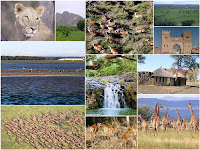Kibera for All and All for Kibera
Early this year, during the aftermath of the general elections - Kenya witnessed the worse violence since independence from Britain , in its urban streets and rural areas. No where else was that violence and carnage as horrifying as in Nairobi; in Kibera slum, in particular. It's in Kibera, a slum of almost a million people, where neighbors and friends brutally turned against each other: looting, killing and raping; even old women and small children - boys and girls - were raped.
That brutality and savagery had very little to do with the elections or tribalism; it had much to do with the economy. Years of economic deprivation and marginalization, had been grooming the seething hatred and anger in the people of Kibera; especially in the youths. Any one living in such deplorable, inhuman conditions as those in Kibera, would surely be angry and hate; angry at and hateful of those and any thing perceived as being, or seems associated, with the cause of the very difficult conditions in the slum.
Kibera, is probably one of the greatest melting pots of the world. A tiny slum, where hundreds of thousands of people have been piled and squeezed together; have been squeezed together due to economic necessity. People of different tribes , cultures and religions; speaking different languages and praying in different ways. People who live in so much poverty and hardships, but still manage to smile and be friendly. During that very brief dark, period in Kenya's history - some Kiberans let that anger and hatred overtake and dominate them; and turn them in to monsters.
Monsters who brutally ruled and ran the streets of Kibera. Had that political differences among Kenyan leaders and politicians and the instability continued - the anger and hatred from Kibera would have moved and caught up with the better offs and the wealthy of Nairobi; it would have moved to the posh suburbs and the comfortable gated communities. The gangs from the slums, would have ruled and dictated on these suburbs; most probably - more brutally and more violently than they did in their own slums.
Most Kenyan politicians and most of the affluent in Nairobi, never go to Kibera; if they do, it's only to pass by on one of the roads on the slum's outskirts. They avoid Kibera. It's a place which they prefer not - to think of; to ignore. But, if Nairobians and Kenyans want to assure their long lasting peace and security - Kibera and other slums around the city, should not be overlooked and ignored. In the same way, some caring and kind Nairobians went out and helped the fleeing and needy from Kibera during the crisis - the government and the people of Nairobi should, now, do all it takes to make Kibera a place which can heal the boiling anger and hatred. And make Kibera not a place where its people and conditions are simply a tourist attraction, but a place where the people of Nairobi and Kenya wouldn't mind being and living in.
That brutality and savagery had very little to do with the elections or tribalism; it had much to do with the economy. Years of economic deprivation and marginalization, had been grooming the seething hatred and anger in the people of Kibera; especially in the youths. Any one living in such deplorable, inhuman conditions as those in Kibera, would surely be angry and hate; angry at and hateful of those and any thing perceived as being, or seems associated, with the cause of the very difficult conditions in the slum.
Kibera, is probably one of the greatest melting pots of the world. A tiny slum, where hundreds of thousands of people have been piled and squeezed together; have been squeezed together due to economic necessity. People of different tribes , cultures and religions; speaking different languages and praying in different ways. People who live in so much poverty and hardships, but still manage to smile and be friendly. During that very brief dark, period in Kenya's history - some Kiberans let that anger and hatred overtake and dominate them; and turn them in to monsters.
Monsters who brutally ruled and ran the streets of Kibera. Had that political differences among Kenyan leaders and politicians and the instability continued - the anger and hatred from Kibera would have moved and caught up with the better offs and the wealthy of Nairobi; it would have moved to the posh suburbs and the comfortable gated communities. The gangs from the slums, would have ruled and dictated on these suburbs; most probably - more brutally and more violently than they did in their own slums.
Most Kenyan politicians and most of the affluent in Nairobi, never go to Kibera; if they do, it's only to pass by on one of the roads on the slum's outskirts. They avoid Kibera. It's a place which they prefer not - to think of; to ignore. But, if Nairobians and Kenyans want to assure their long lasting peace and security - Kibera and other slums around the city, should not be overlooked and ignored. In the same way, some caring and kind Nairobians went out and helped the fleeing and needy from Kibera during the crisis - the government and the people of Nairobi should, now, do all it takes to make Kibera a place which can heal the boiling anger and hatred. And make Kibera not a place where its people and conditions are simply a tourist attraction, but a place where the people of Nairobi and Kenya wouldn't mind being and living in.


